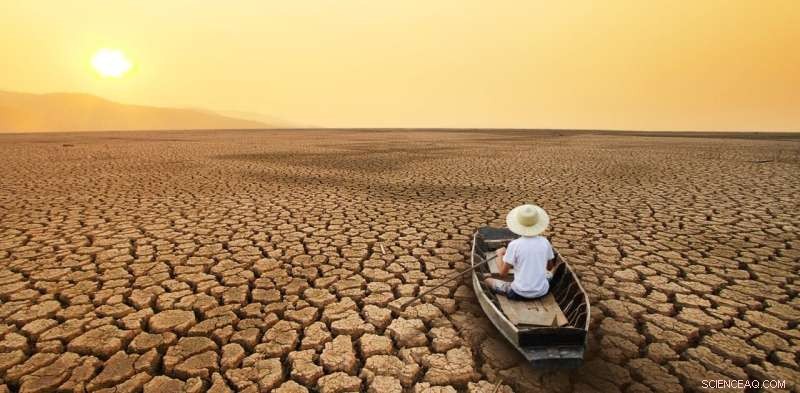
Credito:Piyaset / shutterstock
L'ultimo rapporto delle Nazioni Unite sui potenziali impatti dei cambiamenti climatici emette un verdetto cupo, con alcuni effetti ormai ritenuti inevitabili. Ma ci sono anche lezioni sui disastri e sui conflitti violenti che potrebbero aiutare a salvare vite umane e creare società più sicure indipendentemente dai cambiamenti climatici causati dall'uomo.
Il principale testo disponibile del rapporto del Gruppo intergovernativo sui cambiamenti climatici (IPCC) su "Impatti, adattamento e vulnerabilità" è un riassunto di 35 pagine per i responsabili politici, che secondo le regole dell'IPCC, è approvato dai governi degli stati membri.
Gli scienziati dell'IPCC sono nominati dagli Stati membri e questi ricercatori che contribuiscono non producono nuova scienza. Riassumono le decine di migliaia di articoli scientifici sottoposti a revisione paritaria sui cambiamenti climatici dalla precedente valutazione (l'ultimo importante rapporto IPCC su impatti, adattamento e vulnerabilità è stato pubblicato nel 2014).
Gli scienziati ricevono quindi migliaia di commenti di revisione su bozze che richiedono revisioni testuali o risposte. Nel fare una serie di affermazioni sulla nostra comprensione del cambiamento climatico, il rapporto assegna livelli di confidenza come "basso" o "molto alto" per indicare quanto gli autori siano certi di ciascuno di essi.
L'attuale rapporto è stato oscurato dal fatto che gli scienziati ucraini hanno dovuto lasciare la sessione di approvazione per prendersi cura di se stessi e delle loro famiglie durante l'invasione russa del loro paese. Tuttavia, circa 90 scienziati provenienti da tutti i continenti abitati e in equilibrio tra donne e uomini hanno redatto il documento. Come spesso accade, sono emerse segnalazioni di spinte politiche per rimuovere contenuti scientifici che enfatizzano la natura politica del materiale.
Disastri e cambiamenti climatici
In qualità di accademico che si occupa di ricerca sui disastri e sulla salute, ero particolarmente interessato al modo in cui il rapporto esaminava il cambiamento climatico come causa di disastri, compresi i conflitti violenti, e stabiliva le azioni per evitarli.
Il riassunto dell'IPCC evita del tutto l'espressione "disastro naturale". Ciò riflette decenni di lavoro che spiegano che i disastri sono causati da fonti di vulnerabilità, come l'accesso ineguale e iniquo a servizi essenziali come l'assistenza sanitaria o infrastrutture mal progettate o costruite come le centrali elettriche, piuttosto che dal clima o da altre influenze ambientali.
Il rapporto afferma, con grande sicurezza, che "il cambiamento climatico sta contribuendo a crisi umanitarie in cui i rischi climatici interagiscono con un'elevata vulnerabilità". In altre parole, la vulnerabilità deve esistere prima che possa emergere una crisi. Il cambiamento climatico non è la causa principale del disastro. The report explains that places with "poverty, governance challenges and limited access to basic services and resources, violent conflict and high levels of climate-sensitive livelihoods" are more vulnerable to climate change impacts.

Mozambique is one of the world’s most vulnerable countries, according to the Climate Risk Index. Credit:fivepointsix / shutterstock
For example, cyclones still lead to disasters in Bangladesh. Nevertheless, the country has substantially reduced deaths and damage through concerted efforts to reduce vulnerabilities. These include building thousands of storm shelters and issuing early warnings by multiple means. These measures have made cyclones less deadly even as the storms have become more intense due to climate change.
Weather disasters which kill more people tend to occur where communities and infrastructure are more vulnerable, according to the report. Heat is rightly highlighted as a major concern, since it causes crops to fail and forces people to halt work. That said, it is surprising that the health impacts of humidity, which can combine with extreme heat to deadly effect, are not mentioned.
The report explains that disaster risk and impacts can be reduced by tackling fundamental issues which cause vulnerability, no matter what the weather and climate do. It places high confidence in risk management, risk sharing, and warning strategies as key tasks for adapting to climate change.
Violent conflict and climate change
As with disasters, the report cannot attribute violent conflict to climate change. With high confidence, the report states that "compared to other socioeconomic factors the influence of climate on conflict is assessed as relatively weak." This corroborates other research which argues peace and conflict are more determined by social and political factors than by climate or weather.
The authors identify, with high confidence, actions to reduce the "underlying vulnerabilities" which raise the risk of violent conflict. These can be based on research and might include redistributing wealth and resources to make societies more equal and equitable, while providing diverse livelihoods. Adapting to climate change is only part of the solution. Scientific analyses note how development, rather than climate change adaptation only, is the most effective overall.
In fact, despite frequent assumptions that climate change caused or was linked to violent conflicts in the past, the summary implies that no single conflict should be attributed to climate change, natural or anthropogenic. This conclusion matches analyses for Darfur in 2003 and Syria in 2011.
Summary of the summary
The IPCC's press release on the new report was headlined "Climate change:a threat to human wellbeing and health of the planet." Its stark opening detailed "dangerous and widespread disruption." Yet its subtitle, "Taking action now can secure our future," needs emphasizing. This is particularly the case for disasters and violent conflicts which, the summary document states with high confidence, are not significantly influenced by human-caused climate change.
Perhaps the press release mentions neither disasters nor violent conflict because they represent comparatively positive news among the bleakness. Ultimately, "taking action now" means applying the science of disasters and conflict for prevention. Then, we save lives and livelihoods, no matter what climate change does.